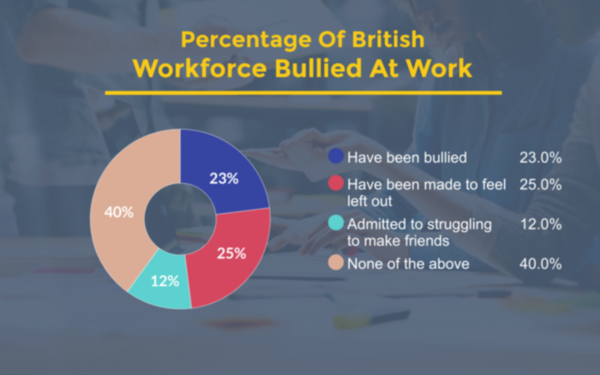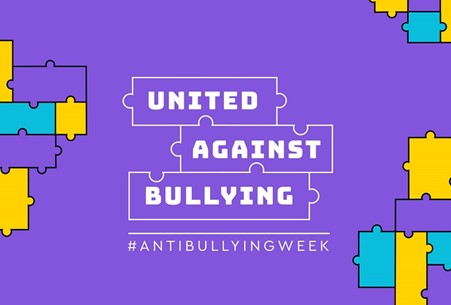Anti Bullying Week
From 16th to 24th November it is Anti Bullying Week. When we think of bullies, we tend to remember the ones we knew at school. Unfortunately, bullying does not stop there for everyone. A survey revealed that 1/4 of UK Employees have experienced bullying or been made to feel left out in their place of work.

The workplace bully deliberately manipulates, belittles, intimidates and tries to control or undermine their victim using any means available to them. In this digital age, the workplace bully’s playground has now extended to cyberbullying with the use of email, mobile phones and social media sites like Twitter or Facebook. This type of bullying can range from bosses unfairly dismissing employees via email to line managers making decisions without following proper procedure. Bullying at work and anti-social behaviour is resulting in stress and has become a fact of life for too many workers in the UK. However, your employer has a ‘Duty of Care’ to provide a safe and stress-free place of work for all staff.

What is workplace bullying?
Workplace bullying is an “offensive, intimidating, malicious, insulting or humiliating behaviour, abuse of power or authority which attempts to undermine an individual or group of employees and which may cause them to suffer stress”. There are many types and forms of bullying fro example:
Bullying includes abuse, physical or verbal violence, humiliation and undermining someone’s confidence. You are probably being bullied if you are:
- constantly picked on
- humiliated in front of colleagues
- regularly treated unfairly
- physically or verbally abused
- blamed for problems caused by others
- given too much to do, so that you regularly fail in your work
- regularly threatened with the sack
- unfairly passed over for promotion or denied training opportunities
Nearly a third of people have been bullied at work – with women experiencing it more than men. The highest prevalence of workplace bullying is among 40 to 59-year-olds, where 34% of people are affected. And, rather shockingly, in nearly three-quarters (72%) of cases, bullying is carried out by a manager.

How to know if you’re being bullied
Sometimes it’s difficult to prove you’re being harassed or threatened at work. When the bullying has been consistent and subtle over a sustained period, you might start to doubt your own sanity or convince yourself that it is OK. To determine if your work colleague or boss is actually bullying you, ask yourself the following questions:
– Do I feel intimidated or threatened at work?
– Am I regularly humiliated or ridiculed in front of my colleagues?
– Have I been called names?
– Are my efforts consistently undervalued or disregarded?
– I feel sick or nauseous when working with a particular colleague or manager?
If the answer to these questions is YES then there is a good possibility that you are being bullied at work. Bullying can create stress and anxiety amongst staff and is one of the biggest contributors of stress-related health problems, including debilitating feelings of anxiety, panic attacks and clinical depression. In some instances, bullying can even lead to suicide.
What you should do if you are bullied at work
Employers have a ‘duty of care’ to their employees and this includes dealing with bullying at work. There are measures you can take if you are being bullied.
Get advice:
Speak to someone about how you might deal with the problem informally. This might be talking to:
- an employee representative like a trade union official
- someone in the firm’s human resources department
- your manager or supervisor
Some employers have specially trained staff to help with bullying and harassment problems, sometimes called ‘harassment advisers’. If the bullying is affecting your health, visit your doctor. It’s also not possible to make a legal claim directly about bullying, but complaints can be made under laws covering discrimination and harassment. If you’re forced to resign due to bullying you can make a constructive dismissal claim.

Talk to the bully
The bullying may not be deliberate as the person concerned may not realise how their behaviour has been affecting you. If you can, talk to the/them directly but work out what to say beforehand. Describe what is been happening and why you object to it. Stay calm and be polite. If you do not want to talk to them yourself, ask someone else to do so for you.
Keep a written record or diary
Write down details of every incident and keep copies of any relevant documents.
Making a formal complaint
If you cannot solve the problem informally, you should make a formal complaint.
To do this, you must follow your employer’s grievance procedure, or if one does not exist you can use the statutory grievance procedure.
- Grievance procedures
- How to resolve a problem at work
- Code of Practice on disciplinary and grievance procedures
Charity who can help you if you are experiencing any kind of bullying
https://www.bullying.co.uk/
https://bulliesout.com/
https://www.samaritans.org/
https://www.cybersmile.org/
https://www.anti-bullyingalliance.org.uk/
https://www.nationalbullyinghelpline.co.uk/about.html
https://www.mind.org.uk/information-support/your-stories/workplace-bullying-and-eating-disorders/

The theme for Anti-Bullying Week 2020 is: United Against Bullying. To mark this year Anti Bullying week, Choose Kindness, Acceptance, and Respect. Preventing bullying can start with being a good friend and community member by including everyone in a supportive way. Speak out when you see bullying.




